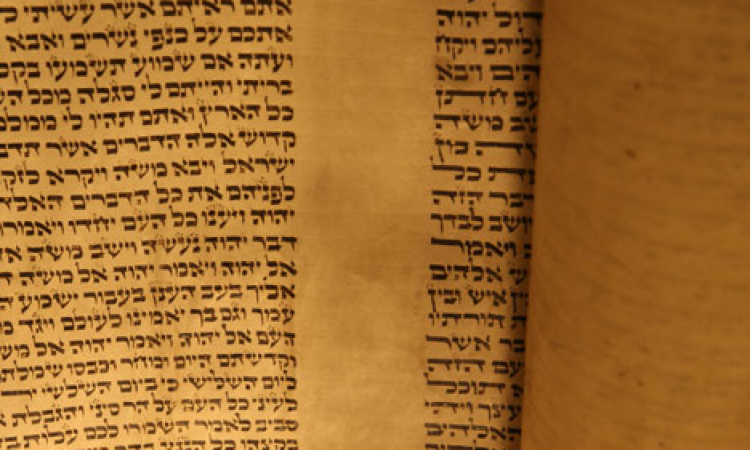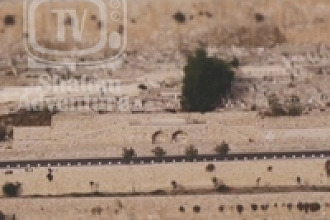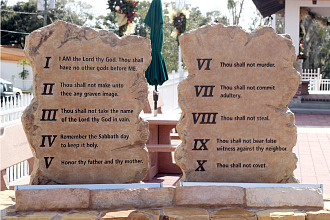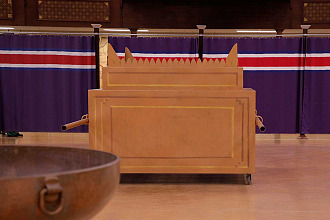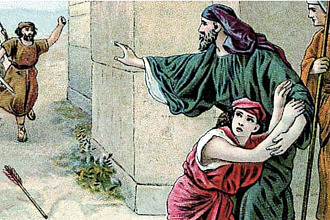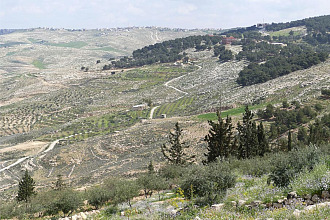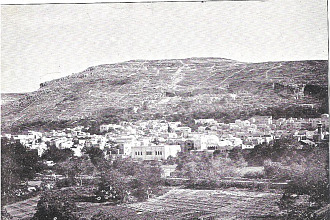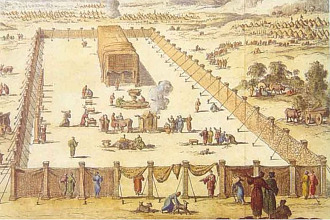Parasha for the Week: Vayera Genesis 18:1 - 22:24
Haftarah for the Week: 2Kings 4:1 - 37
Besorat Yeshua: Mark 10:41 - 52
Overview
After performing brit-mila "circumcision," Abraham is visited by God and two angels.
When three beings appear in human form, Abraham rushes to show them hospitality by bringing them into his tent.
Sarah laughs when she hears from them that she will bear a son next year.
One of the three beings that came to Abraham turns out to be God. God reveals to Abraham that He will destroy Sodom, and Abraham pleads for Sodom to be spared.
God agrees that if there are fifty righteous people in Sodom He will not destroy it.
Abraham "bargains" God down to ten righteous people. However, not even ten can be found.
The other two of Abraham's visitors turn out to be angels. They go to Sodom and visit Lot, Abraham's nephew. Lot, his wife and two daughters are rescued before Sodom is destroyed.
Lot's wife looks back and is turned into a pillar of salt.
Lot's daughters fear that as a result of the destruction there will be no husbands for them. They decide to get their father drunk and through him to perpetuate the human race.
From the elder daughter, Moab is born, and from the younger, Ammon.
Abraham moves to Gerar where Abimelech abducts Sarah.
After God appears to Abimelech in a dream, he releases Sarah and appeases Abraham.
As promised, a son, Itzchak, is born to Sarah and Abraham.
On the eighth day after the birth, Abraham circumcises him as commanded.
Sarah tells Abraham to banish Hagar and Hagar's son Ishmael.
Abraham is distressed about banishing his son Ishmael, but God tells him to listen to Sarah.
After nearly dying of thirst in the desert, Ishmael is rescued by an angel and God promises that he will be the progenitor of a mighty nation.
God instructs Abraham to take Itzchak, and to offer him as a sacrifice.
Abraham does this, in spite of ostensibly aborting Jewish nationhood.
At the last moment, God sends an angel to stop Abraham.
The parasha ends with the genealogy and birth of Rivka.
"Abraham's Hospitality"
Avraham invites three visitors to stay for a meal with the words: "I will fetch a morsel of bread that you may sustain yourselves, then go on." (Genesis 18:5). Avraham does not give them a crust of bread, he dines them with a multi-course banquet. Why does Avraham use such a parsimonious invi¬tation? Wouldn't a sumptuous descrip¬tion have been more enticing?
In the Talmud (Bava Metzia 87a) the Sages derive from here the principle that the righteous say little and do much. The wicked, however, say much and do little as we see next week with Efron's false assurances to Avraham when Avraham wants to bury his wife, Sarah.
Rabbi Yeruchem Levovitz, of the Mir Yeshiva, commented on this that talking about what you plan to do is negative. It is superfluous and often counterproduc¬tive. Talking is easier than doing. It cre¬ates expectations. And then, even with the greatest of intent, things happen which prevent doing. There is pleasure in talking about the good you intend to do, but it is a cheap way of getting honor and approval. Talking changes the focus from doing good for its own sake to doing good for the sake of ap¬proval. And there are those who make grandiose promises and then they forget... causing great heartache and pain.
"Marriage"
Ideas for a happy marriage, last week we listed a few, here are some more.
1. Don't ex¬pect your spouse to be perfect and don't make comparisons.
2. Don't cause pain with words. Speak to each other in ways that are mutually respectful.
3. Work towards common agreement in decisions.
4. Write a list of ways that you have benefited from being married to your spouse. Keep add¬ing to the list and reread it frequently.
5. Write a list of your spouse's positive qualities. Keep adding to the list and read it frequently.
6. Keep thinking about what you can do to bring out the best qualities of your spouse. Re-inforce those qualities with words and action.
7. Focus on finding solutions to any prob¬lems that arise. Be solution oriented. Don't just blame and complain. Don't focus on who is more wrong. For a happy marriage, work to-gether to find mutually acceptable solutions.
8. Remember your finest moments. What did you say and do when you felt best about each other? Increase them.
9. Look for positive activities you can do to¬gether.
10. Live in the present. What went wrong in the past is the past. You create the present and future with your thoughts, words, and actions right now.
"How to Fulfill God's Will"
The Torah states: "Abraham rose up early in the morning and took bread and a bottle of water and gave it to Hagar. He placed them on her shoulder along with the child and sent her away." (Genesis 21:14) Why does the Torah tell us that Abraham "rose up early in the morning"?
The Torah utilizes the phrase "rose up early in the morning" to tell us that Abraham was so anxious to fulfill the will of the Almighty that he did it at the earliest possible opportunity. What is particularly important to note is that Abraham was anxious to speedily fulfill the Almighty's will even though he himself did not want to send away Hagar. How¬ever, the Almighty agreed with Sarah that Ishmael (Ishmael) would be a negative influence on Itzchak (Isaac) and therefore had to be sent away. In spite of his own feelings and conclusions Abraham quickly took action to fulfill the wishes of the Almighty.
Sending away Ishmael was the exact opposite be¬havior that would have been consistent with Abra¬ham's attribute of loving kindness. He could have procrastinated and pushed off this most painful of actions. His focus was not on whether he personally enjoyed what he did, but on doing what was right in the Almighty's eyes.
HAFTARAH 2Kings 4:1 - 37
This chapter of the 2nd book of Kings tells about the ministry of Elisha and Gehazi his servant to an unnamed lady called the Shunammith, that means a native of Shunem, a city in Israel.
This Haftara is chosen with the Parasha Vayera because of their evidence parallel.
Parasha: Adonai visited Abraham saying: "I will surely return to you in due season, and your wife Sarah shall have a son." (Genesis 18:10). It is a promise to Sarah that she will have a son.
Haftarah: Elisha said to the Shunammith: "At this season, in due time, you shall embrace a son." She replied, "No, my lord, O man of God; do not deceive your servant." The woman conceived and bore a son at that season, in due time, as Elisha had declared to her." (2Kings 4:16,17)
The next point about this haftarah is that this story is special for its length and complexity. Elisha wants to rewards the Shunammith for her kindness to him and not only promised her that she will have a son, but later when this son died, he raised him.
Besorat Yeshua Mark 10:52 - 41
Parasha: Abraham was in contact with Abimelech. Abimelech was acting like Pharaoh, a dictator who does whatever pleases him. "And King Abimelech of Gerar sent and took Sarah" (Genesis 20:2). But God intervened and returned her to Abraham.
Besorah: In this portion of the Besorah, Yeshua knew that the Talmidim would be leaders. He warned them against the temptation of power and dictatorship: "You know that among the Gentiles those whom they recognize as their rulers lord it over them, and their great ones are tyrants over them. But it is not so among you; but whoever wishes to become great among you must be your servant, and whoever wishes to be first among you must be slave of all." (Mark 10:42-44). Yeshua gave the example. He is the king of Israel, the Mashiach, but he came as a servant: "For the Son of Man came not to be served but to serve, and to give his life a ransom for many" (Mark 10:45).
Parasha: We have seen the many miracles in favor of Abraham that occur in this parasha. We have also seen the miracles of Elisha in the Haftara. When the Shunammith's son dies Elisha "...got up on the bed and lay upon the child, putting his mouth upon his mouth, his eyes upon his eyes, and his hands upon his hands; and while he lay bent over him, the flesh of the child became warm." (2Kings 4:34) The child awoke from the dead.
Besorah: The Besorah is also about Miracles. "As He and His Talmidim and a large crowd were leaving Jericho, Bartimaeus, ... a blind beggar, was sitting by the roadside. ... he says, "Y'shua, Son of David, have mercy on me!" ...Yeshua stood said, "What do you want me to do for you?" The blind man said, "let me see again." ...Y'shua said, "Go; your faith has made you well." Immediately he regained his sight and followed him on the way." (Mark 10:46-52).

